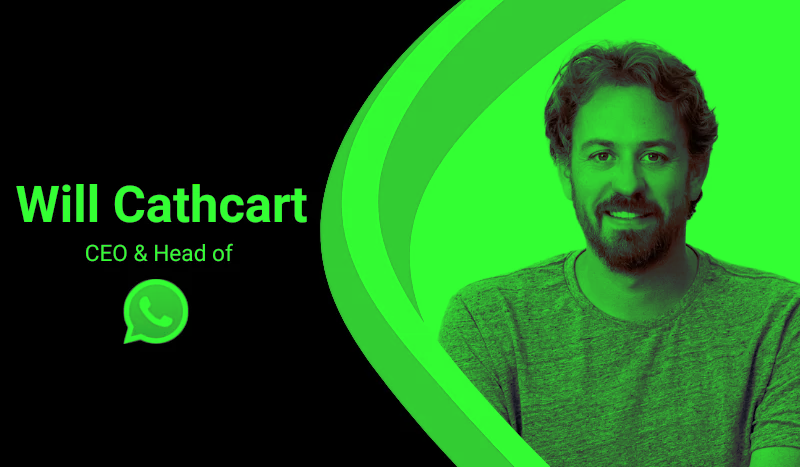Mark Zuckerberg had made some promises when Facebook acquired WhatsApp for approximately billions of dollars nearly a decade ago. The CEO of Facebook promised not to tamper with the chat software too frequently, protecting a positive development.
Even though WhatsApp connected over two billion users worldwide, Mr. Zuckerberg remained committed to that mission. However, in 2019, the app’s growth and commercial potential began to accelerate.
Now, WhatsApp has become significantly important for Meta, the company that owns Facebook, Instagram, and other apps. According to the company’s research, more than half of Americans aged 18 to 35 with a cell phone have installed WhatsApp, making it one of the fastest-growing services among Meta’s most mature markets. The company recently stated that advertising on WhatsApp and its companion messaging service, Messenger, is growing so rapidly that this year its revenue could reach $10 billion.
The 39-year-old Mr. Zuckerberg recently said in an interview, “If you’re imagining what the future of private social platforms will look like, it starts from WhatsApp.”
WhatsApp’s velocity indicates that Meta is constructing a company around its array of social apps. Despite Mr. Zuckerberg’s recent billions spent on his vision for Meta’s sprawling digital cosmos and artificial intelligence, apps like WhatsApp are garnering new users and money.
In recent years, Meta has been investigated for heavy spending, which is Mark Zuckerberg’s personal achievement.

WhatsApp has also become a backbone of Meta’s business, which Mr. Zuckerberg declared as a “year of execution.” Last year, due to global economic uncertainty, after a decline in advertising, Meta reduced its workforce by nearly a third. It depends on its main apps for consistent sales growth and attracting Wall Street’s interest.
Inside the World of Big Tech:
- For example, the social media platform once known as Twitter and acquired by Elon Musk for $44 billion, offered stock grants to employees a year later, revealing that its value was approximately $19 billion.
- Meta: The company said it would offer ad-free subscription options for Facebook and Instagram users in Europe, indicating how government pressure is inspiring major tech companies to transform their core products.
- Amazon: Jeff Bezos’ e-commerce company launched two prototype satellites into space. It will test technologies used in the designated Megaconstellations to provide internet services from the space class, which will ultimately compete with SpaceX’s Starlink service.
- Spotify: The audio streaming platform announced that it will start offering 15 hours of audiobooks per month for premium customers, potentially disrupting the rapidly growing publishing sector.”
The important thing is that WhatsApp used a data connection rather than mobile carrier SMS messages, which often incurred charges. The service didn’t store people’s messages on its servers. And there weren’t some of the time delays and hiccups that other apps like iMessage have, allowing it to run smoothly and seamlessly even on slow data connections.
WhatsApp quickly gained popularity and within a few years, it was downloaded by millions of people worldwide. In this regard, it attracted the attention of two familiar individuals who had already gained fame, both of whom mentioned that it caught Mark Zuckerberg’s eye. After negotiations with Google and the Chinese internet company Tencent, Mark Zuckerberg shut down WhatsApp in 2014.
Initially, Mark Zuckerberg left most of the decisions about WhatsApp to its founders, who remained with the app even after it was acquired by Facebook. Brian Acton and Jan Koum were passionate about making money and running ads, but they also prioritized security on the messaging service. In April 2016, WhatsApp introduced end-to-end encryption, which protects messages from being intercepted or viewed by external parties outside of the conversation.
An independent mobile analyst who keeps an eye on Meta, Eric Seifert, said, “It felt like Facebook had WhatsApp tucked away in his previous job as a ‘greenfield’ opportunity for monetization.” “It’s been worth nearly more than they imagined, where they often said, ‘Who knows how big this business can be?'”
However, by 2019, Mark Zuckerberg was trying to exert more control over his company’s apps, attempting to integrate them so they could share data and technology. This led to the departure of WhatsApp’s founders and other employees from the company. Brian Acton joined a rival company, Signal, and Jan Koum now focuses on philanthropy and purchasing high-end, air-cooled Porsches. Some former WhatsApp executives later accused Mark Zuckerberg of breaking promises about privacy when the company was acquired.
Since then, Mark Zuckerberg has turned WhatsApp into a more fully-featured messaging service and a business. WhatsApp has added features ranging from simple emoji reactions and message forwarding to disappearing messages and support for devices like Mac and Windows desktop computers.
For most of its existence, WhatsApp remained more popular among users outside the United States. But with the addition of new features, more Americans have started giving the app a try. According to the company’s studies, it’s growing fastest with young people in Miami, New York, Los Angeles, and Seattle in the United States. Meta said that a feature similar to Snapchat’s, allowing users to post temporary text, photo, and video updates, known as “Status,” has become the most-used Stories product in the world.
WhatsApp also started offering paid tools and custom apps for businesses looking to use the platform to communicate with consumers. Companies like Sherelle, Lenovo, Samsung, and L’Oréal now use some of these tools, and WhatsApp has formed business and advertising partnerships with companies like Amazon and Uber in Latin America and India.
In 2017, WhatsApp introduced “click-to-message” ads, an ad format that businesses can purchase to place within the Facebook feed. When users click on the ad on Facebook, it links them to a brand’s WhatsApp account where they can engage with customer service representatives or take actions like booking a flight or making a purchase. The company said that this ad format has become the fastest-growing ad format for Meta.
Nissan spent last year developing a chatbot on WhatsApp, which can assist customers in Brazil in communicating and reaching their local car dealerships. The auto company stated that 30 to 40 percent of Nissan’s new sales in Brazil now come through WhatsApp, and the service has reduced response times for customers from an average of 30 minutes to just a few seconds.
Mauricio Grecco, Nissan Brazil’s sales director, said in an interview, “You’re not trespassing because you want to help customers at their pace. It’s about giving our salespeople the tools they need because they genuinely want to sell.”

Description: Meta’s Vice President of Product Management, Nikhil Srinivasan, mentioned that the company is working on enabling people to make payments directly within WhatsApp for items.
Meta’s Vice President of Product Management, Nikhil Srinivasan, stated that the company is building the foundation for payments within WhatsApp and is working with companies in India, Brazil, and Singapore to enable people to make payments directly within WhatsApp for items. He mentioned that more than 200 million businesses use WhatsApp’s professional business app.
However, WhatsApp is facing competition and regulatory challenges. Its biggest rival is Apple’s native messaging app, iMessage, which comes installed on every iPhone and Mac. It’s also competing with smaller but popular upstarts like Signal and Telegram, especially in Europe where they are gaining traction.
In Europe, WhatsApp could be compelled to integrate competing messaging services as part of the requirements of a new law, the Digital Markets Act, according to Eric Seifert. The company has said that it has started the technical work to ensure that WhatsApp can send messages to rival apps in the WhatsApp user zone.

Description: WhatsApp’s Chief Will Cathcart mentioned that the app is “becoming quite mainstream.”
Some regulators have also raised concerns about WhatsApp and iMessage’s key feature, encryption, saying it makes it harder for authorities to monitor or apprehend criminals.
WhatsApp’s CEO, Will Cathcart, has defended the app’s privacy controls and stated that they will “fight for the encryption” against any country trying to weaken it.
One indication of how WhatsApp is evolving is the introduction of a feature called “Channels,” which was unveiled in September. These channels allow people to follow status updates of influential figures, musicians, or anyone who chooses to share their updates, without revealing their phone number or contact information. WhatsApp now has over 225 channels, including The New York Times, each with millions of followers.
Cathcart stated that WhatsApp’s goal is to become a household name, whether it’s for shopping, chatting, or staying on top of news and events.
